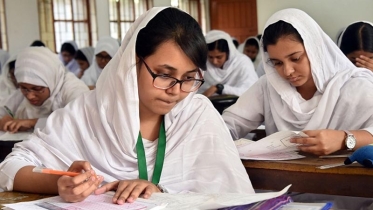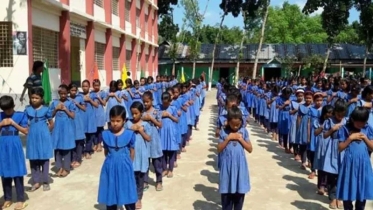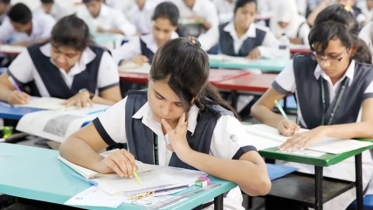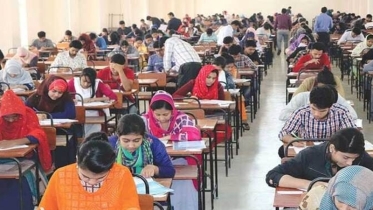সৈকত মুস্তাফিজ
সহকারী অধ্যাপক (ইংরেজি)
উপাধ্যক্ষ, কুইন্স কলেজ, ঢাকা
পরীক্ষক, ঢাকা বোর্ড ও I NTRCA
[email protected]
প্রিয় শিক্ষার্থী বন্ধুগণ,
গত সংখ্যায় আমরা ইংরেজি দ্বিতীয় পত্রের Gap filling with prepositions (without clues) -এর কিছু গুরুত্বপূর্ণ নিয়ম আলোচনা করেছি। আজ আমরা গুরুত্বপূর্ণ কিছু উদাহরণ নিয়ে আলোচনা করব। পরীক্ষায় ১০টি শূন্যস্থানসহ একটি অনুচ্ছেদ দেয়া থাকবে। তোমরা শূন্যস্থানগুলোতে সঠিকpreposition ব্যবহার করবে।
1. Emperor Shah Jahan (a) — Delhi built Taj Mahal. It is a tomb (b) — his wife in Agra. The building is made (c) — fine white marble. It rests (d) — a platform. Four white towers rise (e) — the corners of the terrace. There is a large dome (f) — the centre. There is an open corridor (g) — which visitors can look (h) — carved marble screens (i) — a central room. The Taj Mahal is surrounded (j) — a beautiful garden. There is a long pool in front of the building.
2. Bayazid’s mother was sleeping (a) — her bed. He was reading sitting (b) — her bed. Suddenly she woke (c) —. She told him to give her a glass (d) — water. He stood (e) — from his seat. He went to the jar to fetch water. But there was no water in the jar. The whole locality was (f) — deep sleep. He went (g) — of the house and looked (h) — water but in vain. He remembered the fountain. The fountain was at the other side of the locality. He made (i) — his mind to go there. He went to the fountain with the jar. He filled the jar (j) — water and returned home. But he found his mother lost in deep sleep.
3. A pious man is absorbed (a) — meditation. He has firm faith (b) — the Almighty. He abides (c) — the rules (d) — religion. He is also very simple (e) — his ways of life. He clings (f) — his faith. He knows that man is accountable (g) — the Almighty (h) — his action. So, he leads his life according (i) — religion. He is not angry (j) — anybody.
4. We started for the station early in the morning. We got (a) — the train and luckily I got my seat (b) — a window. The train began to move smoothly. I looked (c) — the window. It seemed that everything was running behind. Now and then the train crossed a bridge (d) — a river (e) — chattering noise. I was really charmed (f) — the beauty in either side of the line. (g) — an eight-hour journey at last our train reached Rajshahi railway station at (h) — 1 pm. We got (i) — from the train and went to my sister’s house (j) — a taxi cab.
5. Bertrand Russel was an outstanding philosopher and perhaps the greatest thinker (a) — the contemporary time. He was born (b) — 1872 (c) — an aristocratic family. He was privately educated and he acquired a perfect knowledge (d) — French and German. (e) — 1890, he went (f) — Trinity College, Cambridge where he graduated (g) — distinction. He was appointed a fellow of his college (h) — the autumn (i) — 1895. (j) — 1895 to the outbreak of the World War he led a simple life.
6. The low income people (a) — Bangladesh are severely affected (b) — blockade and hartal because most autorickshaws and tempos do not operate (c) — hartal/blockade days. Almost all earnings (d) — drivers and helpers are forgone. Some vehicles operate (e) — same personal risk (f) — drivers and helpers but earnings are considerably lower than normal. (g) — continuous hartal/blockade the garment factories were more likely (h) — close down (i) — which casual workers were retrenched and not paid. Small entrepreneurs like hawkers and vendors are badly affected (j) — hartal and political unrest.
7. A fountain pen is an instrument which is used (a) — writing purpose. Nowadays a fountain pen is an essential article (b) — the educated men of all ages. It has two parts-the main body and the cap. The main body holds the nib. It is ages. It is hollow inside and holds ink (c) — its hollow body. Again there is a rubber tube (d) — the hollow bodies of some fountain pens. This rubber tube contains ink. The cap has a clip attached (e) — its end, it protects the nib (f) — being damaged. The cap is screwed (g) — the main body. It is with the help (h) — the clip that one holds a fountain pen (i) — the edge of his pocket. The fountain pens are (j) — different colors, shapes and sizes.
8. Language plays a very important role (a) — the life of human beings. We use language (b) — the moment we wake (c) — in the morning till we go to bed (d) — night. We use language not only during our working hours but also (e) — our dreams. We use language (f) — different purposes. “We use language (g) — express what we feel. We use language to say what we like or dislike. If you do not like tea (h) — milk, you say, “I’ll take tea ()— milk.” We use language to express our strong feelings and emotions. If you are charmed (j) — the scenery of a place, you say, “What a lovely place!”
9. The ceremony began (a) — 2 pm. Our principal presided (b) — the [RTF bookmark start: }_GoBack[RTF bookmark end: }_GoBackfunction. The function started (c) — the recitation (d) — the holy Quran. One (e) — our senior teachers read (f) — the annual report. The Deputy Commissioner, the honorable chief guest, delivered a brief speech. He advised the students (g) — be regular in studies and take part (h) — the movement (i) — illiteracy. We realized that illiteracy is one (j) — the greatest problems in our country.
আরো পড়ুন
শীর্ষ সংবাদ:








